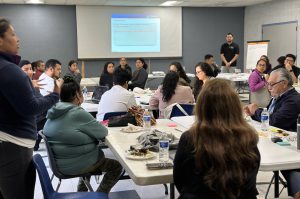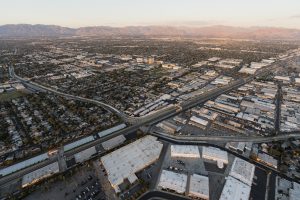
Advancing a Collaborative Agenda in Southeast LA
Advancing a Collaborative Agenda in Southeast LA In 2022, the California Community Foundation (CCF) launched the Regional Recovery Hub to strengthen place-based coordination in Los Angeles County
Variable Definitions:
Traffic Impacts Percentile: The percentile of a given area’s exposure to particulate emissions due to vehicle exhaust, based on traffic volume and road lengths, compared to the rest of LA County
For more information on the California Office of Environmental Health Hazard Assessment’s methodology, visit the CalEnviroScreen homepage.
Source:
California Office of Environmental Health Hazard Assessment – CalEnviroScreen 2.0 (2014), CalEnviroScreen 3.0 (2017), CalEnviroScreen 4.0 (2021)
Years Available:
CalEnviroScreen 2.0:
Data collected from 2009-2011 and published in 2014
CalEnviroScreen 3.0:
Data collected from 2012-2014 and published in 2017
CalEnviroScreen 4.0:
Data collected from 2017-2019 and published in 2021
Traffic impacts represent the vehicles in a specified area, resulting in human exposures to chemicals that are released into the air by vehicle exhaust, as well as other effects related to large concentrations of motor vehicles
While California has the strictest auto-emission standards in the US, the state is also known for its freeways and heavy traffic. Traffic is a significant source of air pollution, particularly in urban areas, where more than 50% of particulate emissions come from traffic. Exhaust from vehicles contains a large number of toxic chemicals, including nitrogen oxides, carbon monoxide, and benzene. Traffic exhaust also plays a role in the formation of photochemical smog. Health effects of concern from these pollutants include heart and lung disease, cancer, and increased mortality.
Citation:

Advancing a Collaborative Agenda in Southeast LA In 2022, the California Community Foundation (CCF) launched the Regional Recovery Hub to strengthen place-based coordination in Los Angeles County

In 2022, the California Community Foundation (CCF) launched the Regional Recovery Hub to strengthen place-based coordination in Los Angeles County regions that were most heavily impacted by
